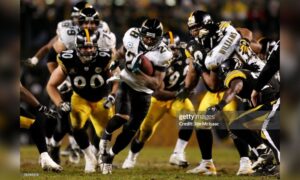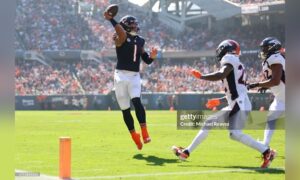A day after two new rule proposals passed during the Owners’ Meetings, we now have some more changes to adjust to after yesterday’s news.
The most significant new rule, in my estimation, is the ability to challenge possession on a play involving a loose ball even if the play was blown dead. This was a no-brainer decision that should have already been in place.
Dubbed informally the NaVorro Bowman Rule thanks to a high-profile incident in the NFC Championship Game last season, this is a rule that also would have benefited the Pittsburgh Steelers last year.
In the team’s win over the Green Bay Packers last season, Steve McLendon blocked a field goal attempt, and Ryan Clark scooped up the ball and attempted to lateral it.
The Steelers were not given possession on the field, and that aspect of the play was not reviewable after the ball was batted, returning possession to the Packers, who went on the score a touchdown soon after that incident.
Another potentially significant rule that was passed will now extend the uprights of the goalpost by an additional five feet, raising them a total of 35 feet off the ground.
This will simply make it easier to determine whether or not a field goal is good in the event that the ball travels above one of the uprights.
As a corollary to this rule, of course, the league has also outlawed touchdown celebrations involving the crossbar, which obviously became an issue after a ‘dunk’ by New Orleans Saints tight end Jimmy Graham dislodged a goalpost from its position and caused a delay of game in order to adjust it.
Raising the goalposts surely only makes them even more sensitive and liable to dislodge, so pairing the two ideas makes sense.
Two other rule changes also passed yesterday, though their significance will likely not be as great as the two aforementioned changes.
The first change simply keeps the clock running following a quarterback sack. This seems like a rather intuitive rule. After all, a quarterback is merely a player and a sack is merely a tackle with a special name.
In no other instance that involves an offensive player being tackled in a situation that does not involve a change of possession is the clock stopped. In my view, this is yet another rule that should have already been in place.
Finally, the manner in which defensive fouls that occur “behind the line of scrimmage” (e.g. “in the backfield) has also been adjusted, and will now be enforced from the line of scrimmage rather than from the spot of the foul or the end of the play.
While I don’t have a strong opinion of this rule either way, I believe that it does make sense, as it doesn’t reward the defense for a play that resulted in a penalty (which would naturally be the case with a play ending in the backfield).







